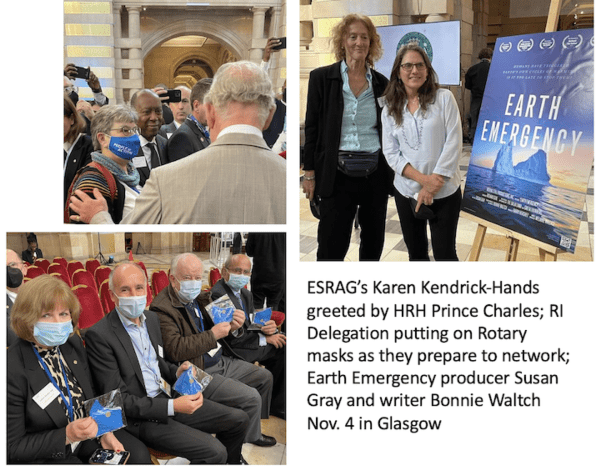Rotarians are connecting with leaders in government, science, and business, delivering the news that Rotary is now mobilized to work on mitigating climate change.
Steps to Stop the Race to Tipping Points.
By Karen D. Kendrick-Hands
Networking at a documentary dramatizing the urgency
At COP 26, Rotarians are connecting with leaders in government, science, and business, delivering the news that Rotary is now mobilized to work on mitigating climate change. The CEO of World Wildlife Fund in the UK was visibly excited to learn that Rotary has added the environment to our list of causes. On Nov. 4, the Rotary Delegation, led by Judith Diment, MBE, attended a showing of “Earth Emergency”. This 52-minute documentary is a synthesis of the five excellent shorts: Climate Emergency: Feedback Loops. We were able to talk with the director, Susan Gray, the writer, Bonnie Waltch, and Dr. Susan Natali, PhD, one of the many scientists who contributed to the film.
“Earth Emergency” highlights a little-discussed phenomenon of climate change: as Earth’s systems are disrupted by unprecedented, unequivocally human-caused warming, the changes feed on themselves, accelerating into a tipping point. Once tipped, the systems will have the momentum to accelerate to a collapse beyond the capacity of human intervention to stop.
At coal-financed Victorian mansion, wealthy nations hear why we must repair the damage
We viewed Earth Emergency at the Kelvingrove Art Gallery and Museum, the staggeringly ornate Victorian monument to the coal-fueled wealth of industrial Glasgow. Developed countries must decarbonize now, and they must share the wealth they have amassed from burning fossil fuels, to help finance the decarbonzation of the developing nations whose people and places are most vulnerable. Scientific data presented by the UN’s Subsidiary Body for Scientific and Technical Advice (SBSTA) demonstrate that every community on the planet is now experiencing impacts from climate change, and every human life is affected.
Dr. Natali, the Arctic Program Director at Woodwell Climate Research Center (originally known as Woods Hole Research Center), is a specialist in permafrost and the methane release that accompanies its thawing. She explained that the thawing also exposes carcasses of animals that died from or with infectious diesases which can infect modern humans and animals before they can develop defenses. The Earth Information Day events at COP26 called on participants to make transdisciplinary connections. We will be connecting Dr. Natali to the One Health initiative of the Global Health institute at the University of Wisconsin Madison.
In the chaos that typifies this COP, the Friday evening reception was rescheduled because of security concerns over large public demonstrations planned for that time. Sadly, the time change led to a smaller audience and much more limited opportunity with HRH Prince Charles. Karen Kendrick-Hands shared a fleeting moment with him, just long enough to hand him ESRAG’s card at the Zero Hour event he hosted after the film on Nov. 4.
Ways Rotarians can contribute, globally and at home
As Rotary enters the world stage of climate action, our message is that we intend to leverage what we learned in our End Polio Now campaign to catalyze climate solutions.
Nov. 4 was packed with powerful wake-up calls for COP26 participants on the crisis and what we need to do to mitigate and adapt as humanity runs out of time. As trusted messengers in our communities, regions, and nations, there’s plenty Rotarians can do to catalyze solutions. Here are steps you can take:
- Plan a family-and-friends watch party on Dec. 29, 2021 when “Earth Emergency” airs on PBS stations across the US. Watch for details and additional viewing opportunities. You can view the five segments now at the Feedback Loops website.
- Consider the framing in this article as you prepare to talk to decision-makers who think acting on the climate crisis is “noble (but too expensive)” rather than “necessary (because I have skin in the game).”
- Learn and teach stakeholders in your community how to use Climate Interactive to understand how our mix of energy and consumption choices determine whether we will reduce emissions by 50% by 2030.
- Introduce your friends, club, and colleagues to the tools of Global Footprint. This includes National Footprint and Biocapacity accounts which nations can use to choose high-impact strategies.
